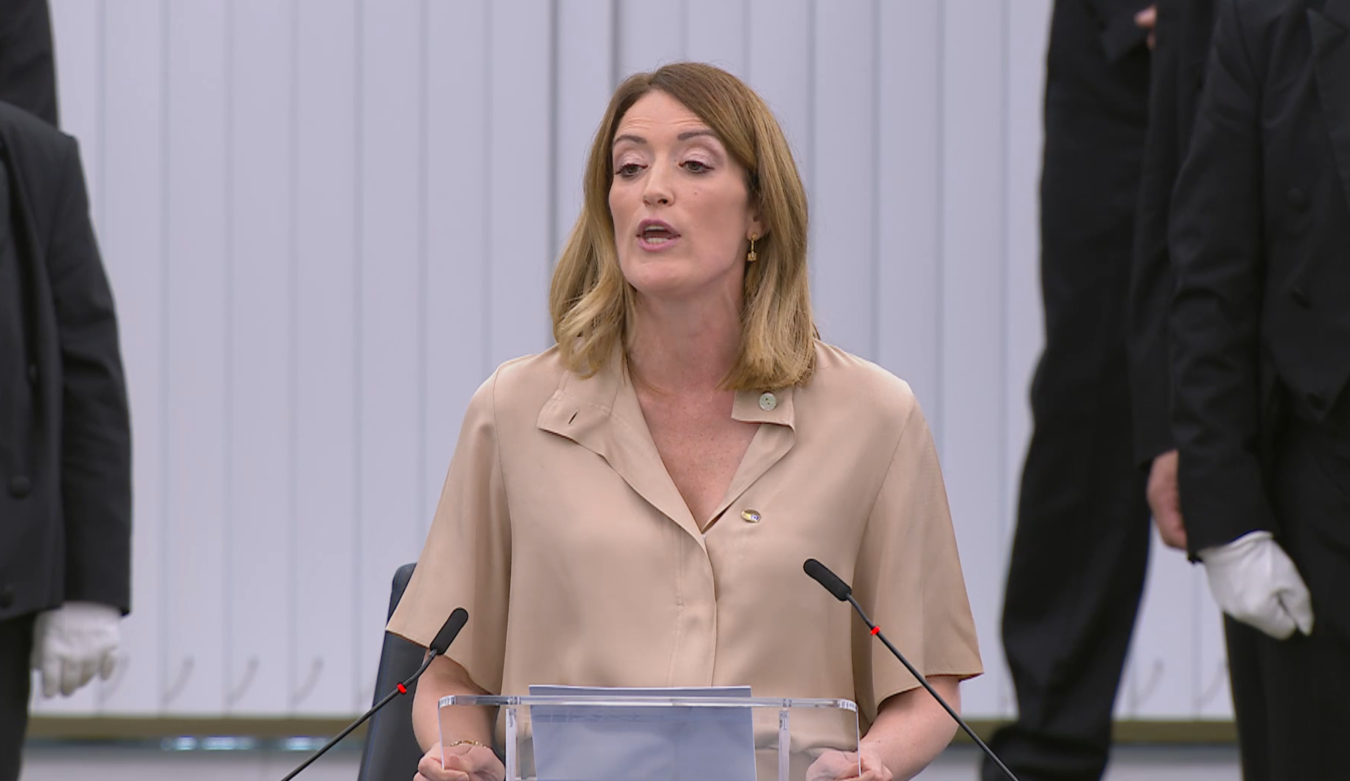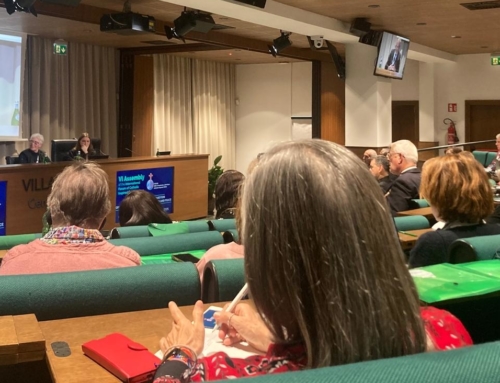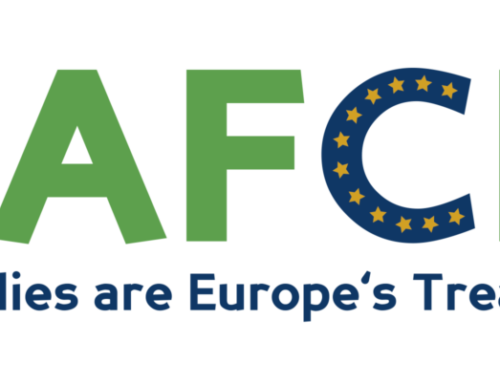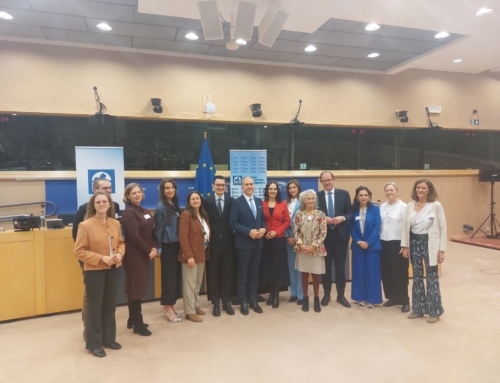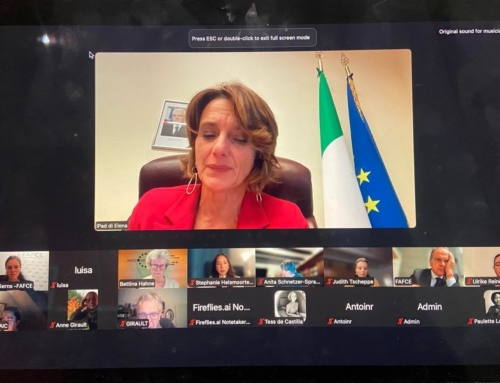Brussels, 17th July 2024
Yesterday the European Parliament elected its President. Roberta Metsola MEP of Malta’s Nationalist Party (EPP) was elected to a second term during July’s Strasbourg plenary, the last until the summer recess. FAFCE warmly congratulates President Metsola and wishes her and all MEPs well in this time of institutional transition.
Metsola participated in FAFCE’s webinar on demographic change and the future of Europe in 2021. During her contribution to the event, she said: “This debate is ultimately about ensuring that no one is left behind. As FAFCE has pointed out, family policies will shape the future of Europe. We must assure parents that they will have a good work-life balance…considering also the role that grandparents play”. She was also present at the inauguration of the European Parliament’s Nativity Scene in 2023.
After the European Parliament elections in June, FAFCE’s President Vincenzo Bassi wrote an open letter to incoming MEPs reflecting on the policy priorities for the family in Europe. Referring to FAFCE’s policy toolkit for the new legislature, Bassi raised the alarm on the demographic winter, the family as an investment, work-family balance, the protection of children, and the ecological transition.
In her speech after accepting her election to a second term, Metsola quoted Pope Saint John Paul II’s call to “be not afraid” in “facing down autocrats, to live out our promise, and to defend Europe. To be not afraid to take the difficult path to use its voice for the common good”. The theme of the common good was repeated when she quoted the late British rabbi Jonathan Sachs who said that “a politics of hope is in reach – but to create it we must find a way of strengthening families and communities, building a culture of collective responsibility and insisting on an economics of the common good.” She highlighted the need to “recapture a sense of belief and enthusiasm” held by Europe’s founders such as De Gasperi, adding that we must “build rather than destroy” and “construct a compelling narrative of hope”. Echoing the argument from FAFCE’s President Vincenzo Bassi that communicates Europe’s ‘popular spirit’ over ideological divisions, Metsola said that “this is not about party politics – it is about the very viability of the freedom which was fought so hard and so long for”.
Metsola also put the spotlight on Europe’s current social conditions in saying that we should “reinforce Europe’s social pillar”, encouraging her colleagues to “invest in youth, education, and communities by simplification and cutting red tape”. FAFCE often talks about removing obstacles for families to thrive, as well as the fact that to invest in the family is to invest in the future, since it is the family that provides intergenerational solidarity in a time of an aging population, isolation, and a demographic winter. Indeed, Metsola went on to say that “we have all the knowledge of the world at our fingertips and yet we feel so lonely – Europe must mean community”. Such community is derived from the family, as the basic cell of society.
She reflected on the challenges for young people in today’s Europe, adding that “we cannot move forward if our youth cannot afford to buy, let alone rent, a place that they can call home”. Metsola reiterated the need to “give people hope and dignity in their pensions and wages”. These social realities are one of the key factors in the plummeting birthrates and the exacerbation of the demographic crisis. The issue of demography is transversal and existential, cutting through distinct policy areas. This is why FAFCE has been proposing that the responsibilities for social cohesion and demography are managed under the same office at the Commission.
As well as the demographic transition, Metsola engaged with the digital and ecological transitions too. In the first instance, she urged her colleagues to “harness the opportunities of the digital transition”. FAFCE welcomes this motivation, especially if it is channeled towards a greater flexibility and work-family balance for parents, including a healthy attitude to digital tools such as a right to disconnect and a work-free Sunday. FAFCE reminds also of the necessity to protect children in this digital transition, particularly from the harms of pornography and online abuse by empowering parents with information, tools, and controls.
Regarding the ecological transition, Metsola said that “sustainable development must come hand-in-hand with the protection of our natural environment”. FAFCE’s Spring Board resolution of this year focused on this particular issue, entitled Integral ecology needs at its core the recognition of the family. The resolution emphasised a hopeful message. Unanimously approved, the resolution called for “candidates to the European Parliament elections, European institutions and all national governments to put families at the centre. There is no possible protection of the environment without the protection of the family.”
FAFCE President Vincenzo Bassi commented on the resolution, saying, “the problem is not the children but consumerism. There is no ecology without the person; no person without the family. Therefore, there is no ecology without the families and communities of families at the heart of the transition”. Continuing, he said, “crucial to the success of the ecological transition will be intergenerational solidarity, which requires a protagonisation of the family and networks of families. It is through these networks that we can combat the pandemic of loneliness and build a hopeful future.”
Metsola’s speech touched upon human trafficking, declaring that “no woman should have to choose to put their children’s lives in the hands of criminal gangs” because of the migrant crisis. A tool of human traffickers is often the use of surrogacy, as FAFCE has been continually arguing. Indeed, FAFCE welcomed the EU’s inclusion of surrogacy as a form of human trafficking which has passed through all institutional levels in order to become legislation and the anti-trafficking directive has now come to force this week.
Finally, the President of the European Parliament called for peace to break the “intergenerational cycles of violence”. She urged for a “real peace with justice, liberty, and dignity.” Metsola declared that “Europe remains the answer”. With Russia’s war of aggression against Ukraine and countless conflicts around the world, it is clear that the path to peace must hold up human dignity as a necessary condition. During wars, human dignity is ignored, as we are seeing with the global market of surrogacy that betrays the dignity of the mother and the child, particularly common in Ukraine or countries where poorer and desperate women are coerced into renting their wombs.
FAFCE currently has two members from the President’s home country of Malta – the Cana Movement (full member), and Life Network Foundation Malta, (observer member). As FAFCE’s President Vincenzo Bassi wrote in the open letter to MEPs, the Federation “would like to offer its experience in Europe and its ideas coming from the grassroots of our Member Associations all over the continent. FAFCE is keen to contribute to the solution of today’s challenges and to give voice to families. We will be happy to have a close cooperation during your mandate.”

